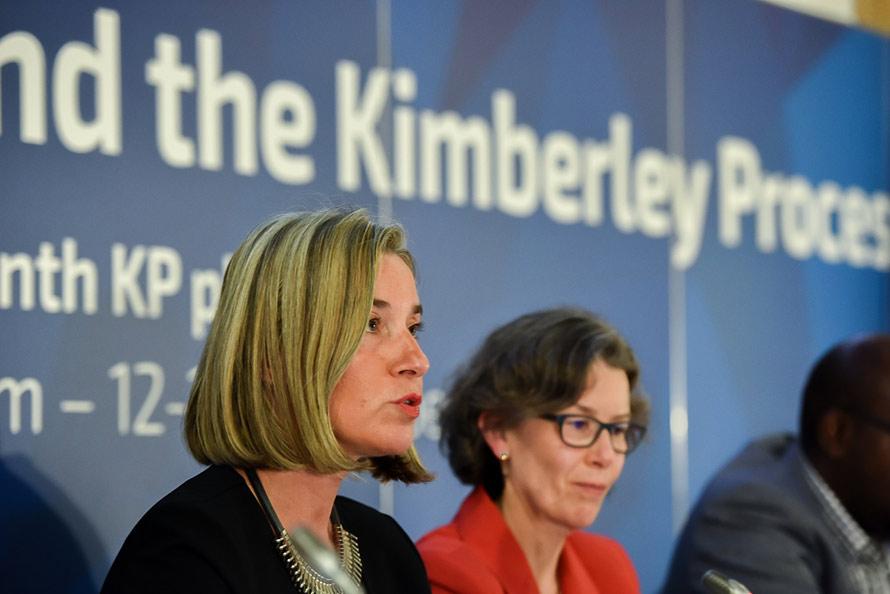
The Brussels Plenary took place in Brussels, Belgium on 12-16 November 2018. It was a productive meeting, with high interaction and constructive deliberations among Participants and Observers in the working bodies, reflected in the final Communique. The ongoing reform and review agenda was in the spotlight during the week. In addition, discussions focused on a variety of issues related to monitoring, the situation in the Central African Republic, technical aspects of diamond trade and statistics, challenges in alluvial and artisanal mining, next to procedural and partnership matters. A special forum took place, devoting particular attention to environmental challenges in diamond mining. Addressing the Plenary, High Representative / Vice President Federica Mogherini made a strong plea to move “from blood diamonds to peace diamonds”.
The EU Chairmanship delivered tangible progress on all of its priorities for the Kimberley Process, i.e. to ensure that the process remains fit for purpose through reform, by reinforcing its unique tripartite structure of governments, industry and civil society, by strengthening its implementation and effectiveness, and by focusing on human conditions in mining as well as the prosperity of producing communities.
Four Administrative Decisions were adopted:
- Administrative Decision on the Establishment of a Kimberley Process Secretariat, which solidifies commitment for the creation of a Permanent Secretariat. The Secretariat’s tasks, location and funding modalities are to be defined in 2019;
- Administrative Decision for Kimberley Process Engagement with External Organizations, providing criteria for the engaging with external international and regional organizations to support the work of KP Working Groups and Committees in a spirit of transparency and inclusiveness;
- Administrative Decision on the Compilation of Modifications to Technical Definitions, which represents a very helpful step towards bringing greater clarity and legal certainty to all Kimberley Process actors; and
- Administrative Decision on the Use of Unified Diamond Nomenclature, which encourages all Participants and Observers of the Kimberley Process to take note of the Diamond Terminology Guideline as a best practice for the industry, establishing terminology for diamonds, synthetic (laboratory grown) diamonds, and imitations of diamonds.
In addition, a procedure at the World Customs Organisation to introduce two 6-digit subheadings for synthetic diamonds is ongoing. The plenary also made significant progress toward the strengthening of the Administrative Decision on Peer Review, as well as in consolidating the Core Document.
The Plenary recalled its commitment to the reform and review of the Kimberley Process, including enhancing its effectiveness and considering how to strengthen the scope of the Kimberley Process in the Core Document. The definition of conflict diamonds is currently strictly limited to “rough diamonds used by rebel movements or their allies to finance conflict aimed at undermining legitimate governments”. In the context of the ongoing reform and review process, the EU has launched in-depth discussions on strengthening the scope of the Kimberley process. Possible avenues include the inclusion of cases of systemic violence and violations of fundamental rights affecting mining communities. The EU will take a step-by-step approach in taking the matter forward. The Plenary reaffirmed the mandate of the Ad Hoc Committee on Review and Reform (AHCRR) until December 2019. Angola will newly chair the AHCRR, with Canada serving as Vice-Chair.
Next to the ongoing work on the reform agenda, several country review visits are scheduled for 2019, and a second Artisanal Diamond Mining Forum is encouraged to take place, aiming to further take stock of best practices and lessons learned.
India will serve as Chair of the Kimberley Process in 2019. Botswana and the Russian Federation successfully submitted a joint candidacy for Vice-Chairmanship during the period of 2019-2020, but sequencing is still to be determined. The Kimberley Process also welcomed Gabon as a new Participant.
Background
In 2018, the European Union holds the Chairmanship of the Kimberley Process, a United Nations (UN)-mandated global partnership bringing together governments, industry and civil society, with the aim to stem the trade in conflict diamonds worldwide. As Chair of the Kimberley Process, the European Commission's Service for Foreign Policy Instruments on behalf of the European Union hosted this year’s Plenary meeting with the participation of over 360 delegates including Ministers and officials from 43 countries as well as representatives from industry and civil society. As a consensus-based body, the Kimberley Process relies on the constructive engagement from all participants of the tripartite structure.
The Kimberley Process Certification Scheme was launched in 2003 as a unique tool for conflict prevention and sustainable development. The EU and international partners representing 81 countries and 99% of the world’s rough diamond production and trade have joined forces to make sure that the production and trade of rough diamonds contributes to peace and sustainable economic and human development.
Based on UN Security Council Resolution A/RES/55/56, the Kimberley Process defines conflict diamonds as “rough diamonds used by rebel movements or their allies to finance conflict aimed at undermining legitimate governments”. The Kimberley Process Certification Scheme imposes so-called minimum requirements on participating states to enable shipments to be certified as “conflict free”.
In support of its work as Chair of the Kimberley Process, the EU is funding several projects with a total volume of close to €9.5 million under the Instrument contributing to Stability and Peace (IcsP) with the aim to reinforce governance in the diamond sector and the development of alternative livelihoods.
For more information
Details
- Publication date
- 26 November 2018
- Author
- Service for Foreign Policy Instruments
